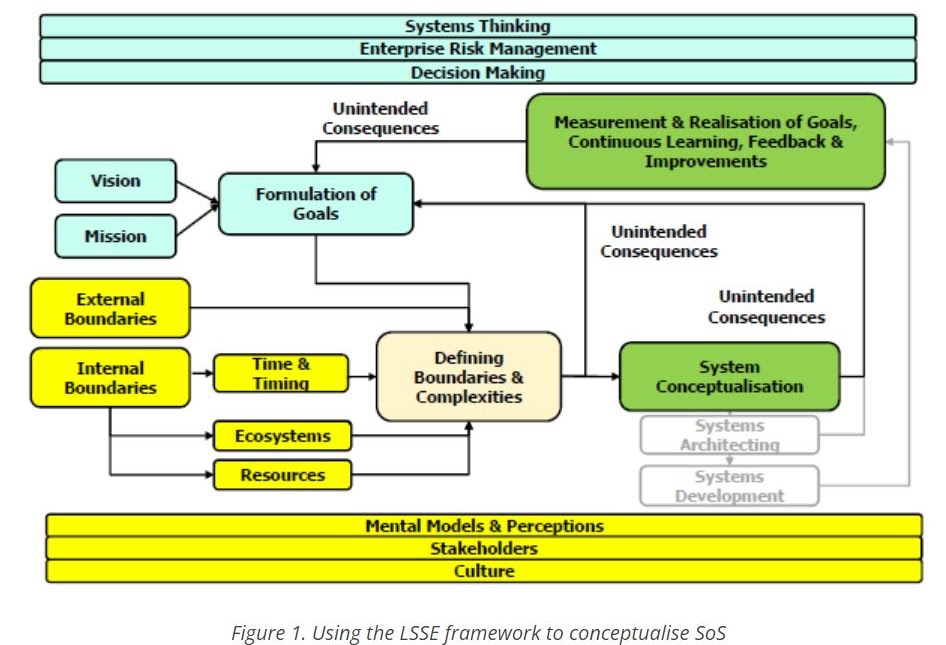Associate Professor Aaron Chia takes us through his experience of teaching an interdisciplinary course (IE5404/DTS5701) on large-scale systems engineering, including an explanation of the framework used and the challenges encountered.
Large-scale systems engineering (LSSE) deals with the conceptualising, designing, building, and managing of “system of systems” (SoS) from a systems engineering perspective. SoS inherently have complexities that could involve politics, economics, society, law, technology, and the environment. Systems thinking is the overarching concept for the LSSE framework (Fig. 1). It is about considering the “big picture” and recognising the dynamic and interdependent nature of its elements and how they change over time.

Curriculum Design
The curriculum is designed in part based on his experiences in having engineering, business and psychology degrees, and working extensively in systems:
Engineering schools teach students how to design and conduct experiments, identify and solve problems, understand professional and ethical responsibility. In addition, systems engineering equips students with the know-how to design, integrate, and manage complex systems over their life cycles. In LSSE, we identify and solve the right problems relating to SoS before designing (conceptualising) it.
Business schools teach about business operations, including the importance of customers, finance, operations, strategy, business policy and communications etc. It is important in LSSE to consider the SoS stakeholders. Strategies and policies are important aspects of LSSE. Economics is an important consideration for most man-made systems.
Social science schools provide students with an understanding of the real world around them such as culture and behaviours etc. They provide in depth knowledge of the mental models, perceptions and culture of the stakeholders that must be considered in socio-technical systems.
Most importantly, systems thinking integrates all these disciplines. As shown in Fig. 1, all the elements in the system are interconnected and affect one another. Integrating goals, economics, technologies, stakeholders’ interest, and environment concerns over time can be very challenging. Trade-offs are required and making decisions on one part of the system could bring about undesired consequences on other parts of the system and also other systems.
The above topics taught in IE5404/DTS5701 promote interdisciplinary learning for engineering students.
Challenges
The most difficult parts of teaching IE5404/DTS5701 were systems thinking and integration, and ensuring that the concept developed is coherent. Students must be constantly reminded that they needed to revisit each part of the concept to ensure that it fitted well with the other parts, and any missing areas and incongruities had to be resolved.
Students discovered that selecting the best option was not easy due to the unique characteristics of each option, as well as the risks and unintended consequences involved. As in real life, there is often no perfect option in the decisions we make. This challenge could be in part due to the interdisciplinary nature of IE5404/DTS5701.
Engineering modules often rely on mathematics and experiments. As such, engineering students are not used to dealing with ambiguities and multiple possible solutions. They are also not familiar with strategies and making policies.
The above challenges are currently being addressed by sharing more case studies/personal examples and feedback via assignments. Coaching sessions on students’ group projects were found to be particularly helpful.
However, this is only the start of their respective journeys. As they start applying these concepts in their personal and work lives, hopefully they can internalise systems thinking and change their outlook and perspectives.
The above content is adapted from the article – NUS CDTL: Teaching Connections Digest, first published on 22 Feb 2022.

